by Joanne Ivancic* (Advanced Biofuels USA) At Hood College just blocks from Advanced Biofuels USA’s headquarters, the Biology Department’ Sustainability Work Group has proposed a new undergraduate major in Sustainability Studies. At Independence, Ohio’s middle school, teachers are exploring putting together a course dedicated to sustainability. Advanced Biofuels USA has learned much from consulting on program development like these.
What I've Learned
“What I’ve learned at events where students and faculty gather, such as EnergyPath in Pennsylvania, and at schools where I’ve been invited to speak,” begins Advanced Biofuels USA executive director Joanne Ivancic, “Is that Environmental Science and Sustainability courses so often leave out the role that renewable fuels can play in reducing greenhouse gas emissions—at all, let alone how they can do it quickly and affordably using existing vehicles. They rarely incorporate the idea that renewable fuels can and should be used more while we wait for electric mobility to become affordable, available, powered by renewables using fair trade batteries.”
She continues, “I’ve seen the results of this lack of education about renewable fuels not only in casual conversations with friends and family, but also in meetings with groups working on GHG reduction policies on the local, state, regional, national and international levels. That’s why I’m so happy to share our resources with those working on these programs, to help those developing teaching modules about making transportation systems greener and cleaner. I’m excited to give the current and the next cohort of public and private decision-makers a broader understanding of sustainability in transportation.”
Educational Resources on Advanced Biofuels USA Website
As a nonprofit educational organization dedicated to promoting the understanding, development and use of advanced biofuels as an economic development, energy security, military flexibility, climate change mitigation and pollution control solution, Advanced Biofuels USA has created and gathered educational resources, posted them on our website and distributed them via a monthly educational newsletter.
Here are where you can find some of these online:
- In the “Education” category along the right margin of every page of the website (AdvancedBiofuelsUSA.org)
- Using the “Biofuels Basics”, “Resources”, and “Education” buttons on the home page. The drop-down boxes include, among others:
What Is Lacking? Role of Renewable Fuels in Sustainable Transportation
Ivancic has been asked if any modules exist that cover the topic of sustainability in transportation. She can point to many programs that have developed elements of the topic, but none that brings them all together with a focus on sustainable transportation, finding that teaching materials usually focus on one type of fuel, one geographic area or on energy in general.
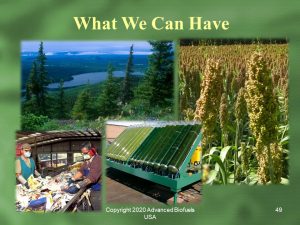 Many of these resources are listed in the FOR TEACHERS page, but may be out of date. She would like to create comprehensive training materials that, like Advanced Biofuels USA, are feedstock, process and product agnostic; that include examples of renewable fuel development and use from around the world and that can be tailored to many grade levels, from elementary school through college, and that can also be used by community/civic/faith organizations.
Many of these resources are listed in the FOR TEACHERS page, but may be out of date. She would like to create comprehensive training materials that, like Advanced Biofuels USA, are feedstock, process and product agnostic; that include examples of renewable fuel development and use from around the world and that can be tailored to many grade levels, from elementary school through college, and that can also be used by community/civic/faith organizations.
What Can You Contribute?
If you have developed and would like to share renewable fuels educational materials or materials about sustainable transportation that includes the role of renewable fuels, Advanced Biofuels USA would like to know about them and consider them for inclusion in their online resources. You can contact Joanne Ivancic via info@AdvancedBiofuelsUSA.org or via the website contact page.
 Ivancic with 7th and 8th graders at Independence Middle School spending their lunch learning about renewable fuels careers, joined by teacher, Rio Vincz (far left) who is developing a sustainability course for the school
Ivancic with 7th and 8th graders at Independence Middle School spending their lunch learning about renewable fuels careers, joined by teacher, Rio Vincz (far left) who is developing a sustainability course for the school
Looking Forward
Here’s a draft outline for a course on renewable fuels in transportation sustainability that has been developed from feedback from teachers, students and others who have expressed an interest in knowing more about the renewable fuels elements of sustainable transportation options.
Your comments, suggestions and contributions are welcome.
Ideas/Outline for Sustainability Course Content from Renewable Fuels Perspective
Introduction: Why Are Renewable Fuels Important? What Value Do They Have?
Cleaner burning (air pollution control)
Climate change mitigation
Environmental benefits of growing, using waste, recycling carbon, compared to mining, fracking
Energy Security
Military Flexibility
Economic Development
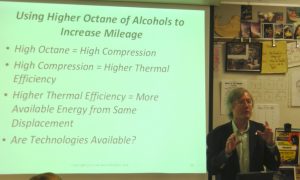 Advanced Biofuels USA Co-founder, treasurer Bob Kozak, teaches a high school auto mechanics class in Florida.
Advanced Biofuels USA Co-founder, treasurer Bob Kozak, teaches a high school auto mechanics class in Florida.
Engine Overview
Spark ignition
Compression ignition
Fuel cells
Hydrogen
Ethanol
Electric
Jet/Aviation
Compressed Natural Gas Engines
Maritime Engines
Rockets
Other
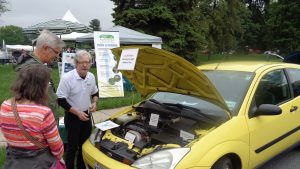 Bob Kozak explains the system used to enable 2002 Ford Focus to use E85 fuel at Frederick, MD, community green festival
Bob Kozak explains the system used to enable 2002 Ford Focus to use E85 fuel at Frederick, MD, community green festival
Properties or Characteristics Important for Fuels Used in Engines
Octane
Oxygenation
Other Relevant Chemical Composition and Combustion Items
Definition of Hydrocarbon
Hydrogen
Soot/Black Carbon
Compression Ratios
Heat of Vaporization
Fuel/Engine Optimization
Renewable Fuels
What are they?
Reprise of Why Are They Important
How are they used?
Yesterday (Rudolf Diesel and peanut oil; Henry Ford and ethanol)
Today
Tomorrow
How are they made?
Feedstocks
Conversion Technologies
Logistics
Distribution/Use
Retail
Fleets
Airports
Reprise of engine section
Role of Markets and Policy in Helping or Hurting Wider/Increased Use of Renewable Fuels
Market Forces that Help or Hinder
Policies that Help or Hinder
Environmental Justice (For example, use of carbon tax for infrastructure providing cleaner, more affordable fuels in high pollution and low income areas)
Conclusion/Summary
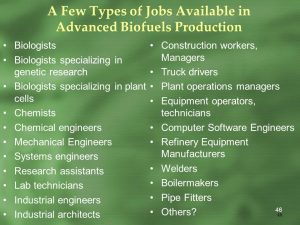 Each section can include mention of the types of jobs related to that section.
Each section can include mention of the types of jobs related to that section.
Each section could also include a list of questions for small group discussion that focus on the three elements of sustainability: environmental, economic and social. Such questions would lead to students thinking of community or research projects that they might do if they want to help increase the use of renewable fuels, incorporate fuels into a circular economy, etc.
Examples of questions:
Environmental: How can growing crops, using forest products, growing algae, using waste from agriculture, food processing or municipal waste help and/or hurt the environment?
Economic: How will we economically produce and transport feedstock to biorefineries and fuel to customers? What are uses for biofuels in the near future? How do we integrate renewable fuels into daily life?
Social: How do we use land for food/fuel/feed/fiber and fun? Who gets to decide how land is used locally, nationally, internationally?
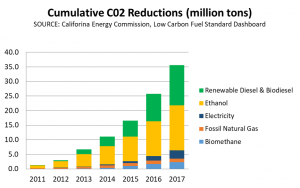 Renewable diesel, biodiesel and ethanol are most effective in reducing greenhouse gas emissions under California's Low Carbon Fuel Standard. (Graph from Diesel Technology Forum)
Renewable diesel, biodiesel and ethanol are most effective in reducing greenhouse gas emissions under California's Low Carbon Fuel Standard. (Graph from Diesel Technology Forum)
Include how any of these sections relate to standard curriculum elements and standardized testing elements.
What do you think? We'd like to know. Also, if you want to contribute to this effort, contact: Joanne Ivancic, Executive Director, Advanced Biofuels USA 301-644-1395 / info@advancedbiofuelsusa.org
Nearly 55,000 articles in our online library!
Use the categories and tags listed below to access the nearly 50,000 articles indexed on this website.
Advanced Biofuels USA Policy Statements and Handouts!
- For Kids: Carbon Cycle Puzzle Page
- Why Ethanol? Why E85?
- Just A Minute 3-5 Minute Educational Videos
- 30/30 Online Presentations
- “Disappearing” Carbon Tax for Non-Renewable Fuels
- What’s the Difference between Biodiesel and Renewable (Green) Diesel? 2020 revision
- How to De-Fossilize Your Fleet: Suggestions for Fleet Managers Working on Sustainability Programs
- New Engine Technologies Could Produce Similar Mileage for All Ethanol Fuel Mixtures
- Action Plan for a Sustainable Advanced Biofuel Economy
- The Interaction of the Clean Air Act, California’s CAA Waiver, Corporate Average Fuel Economy Standards, Renewable Fuel Standards and California’s Low Carbon Fuel Standard
- Latest Data on Fuel Mileage and GHG Benefits of E30
- What Can I Do?
Donate
DonateARCHIVES
- July 2025
- June 2025
- May 2025
- April 2025
- March 2025
- February 2025
- January 2025
- December 2024
- November 2024
- October 2024
- September 2024
- August 2024
- July 2024
- June 2024
- May 2024
- April 2024
- March 2024
- February 2024
- January 2024
- December 2023
- November 2023
- October 2023
- September 2023
- August 2023
- July 2023
- June 2023
- May 2023
- April 2023
- March 2023
- February 2023
- January 2023
- December 2022
- November 2022
- October 2022
- September 2022
- August 2022
- July 2022
- June 2022
- May 2022
- April 2022
- March 2022
- February 2022
- January 2022
- December 2021
- November 2021
- October 2021
- September 2021
- August 2021
- July 2021
- June 2021
- May 2021
- April 2021
- March 2021
- February 2021
- January 2021
- December 2020
- November 2020
- October 2020
- September 2020
- August 2020
- July 2020
- June 2020
- May 2020
- April 2020
- March 2020
- February 2020
- January 2020
- December 2019
- November 2019
- October 2019
- September 2019
- August 2019
- July 2019
- June 2019
- May 2019
- April 2019
- March 2019
- February 2019
- January 2019
- December 2018
- November 2018
- October 2018
- September 2018
- August 2018
- July 2018
- June 2018
- May 2018
- April 2018
- March 2018
- February 2018
- January 2018
- December 2017
- November 2017
- October 2017
- September 2017
- August 2017
- July 2017
- June 2017
- May 2017
- April 2017
- March 2017
- February 2017
- January 2017
- December 2016
- November 2016
- October 2016
- September 2016
- August 2016
- July 2016
- June 2016
- May 2016
- April 2016
- March 2016
- February 2016
- January 2016
- December 2015
- November 2015
- October 2015
- September 2015
- August 2015
- July 2015
- June 2015
- May 2015
- April 2015
- March 2015
- February 2015
- January 2015
- December 2014
- November 2014
- October 2014
- September 2014
- August 2014
- July 2014
- June 2014
- May 2014
- April 2014
- March 2014
- February 2014
- January 2014
- December 2013
- November 2013
- October 2013
- September 2013
- August 2013
- July 2013
- June 2013
- May 2013
- April 2013
- March 2013
- February 2013
- January 2013
- December 2012
- November 2012
- October 2012
- September 2012
- August 2012
- July 2012
- June 2012
- May 2012
- April 2012
- March 2012
- February 2012
- January 2012
- December 2011
- November 2011
- October 2011
- September 2011
- August 2011
- July 2011
- June 2011
- May 2011
- April 2011
- March 2011
- February 2011
- January 2011
- December 2010
- November 2010
- October 2010
- September 2010
- August 2010
- July 2010
- June 2010
- May 2010
- April 2010
- March 2010
- February 2010
- January 2010
- December 2009
- November 2009
- October 2009
- September 2009
- August 2009
- July 2009
- June 2009
- May 2009
- April 2009
- March 2009
- February 2009
- January 2009
- December 2008
- November 2008
- October 2008
- September 2008
- August 2008
- July 2008
- June 2008
- May 2008
- April 2008
- March 2008
- February 2008
- January 2008
- December 2007
- November 2007
- October 2007
- September 2007
- August 2007
- June 2007
- February 2007
- January 2007
- October 2006
- April 2006
- January 2006
- April 2005
- December 2004
- November 2004
- December 1987
CATEGORIES
- About Us
- Advanced Biofuels Call to Action
- Aviation Fuel/Sustainable Aviation Fuel (SAF)
- BioChemicals/Renewable Chemicals
- BioRefineries/Renewable Fuel Production
- Business News/Analysis
- Cooking Fuel
- Education
- 30/30 Online Presentations
- Competitions, Contests
- Earth Day 2021
- Earth Day 2022
- Earth Day 2023
- Earth Day 2024
- Earth Day 2025
- Executive Training
- Featured Study Programs
- Instagram TikTok Short Videos
- Internships
- Just a Minute
- K-12 Activities
- Mechanics training
- Online Courses
- Podcasts
- Scholarships/Fellowships
- Teacher Resources
- Technical Training
- Technician Training
- University/College Programs
- Events
- Coming Events
- Completed Events
- More Coming Events
- Requests for Speakers, Presentations, Posters
- Requests for Speakers, Presentations, Posters Completed
- Webinars/Online
- Webinars/Online Completed; often available on-demand
- Federal Agency/Executive Branch
- Agency for International Development (USAID)
- Agriculture (USDA)
- Commerce Department
- Commodity Futures Trading Commission
- Congressional Budget Office
- Defense (DOD)
- Air Force
- Army
- DARPA (Defense Advance Research Projects Agency)
- Defense Logistics Agency
- Marines
- Navy
- Education Department
- Energy (DOE)
- Environmental Protection Agency
- Federal Energy Regulatory Commission (FERC)
- Federal Reserve System
- Federal Trade Commission
- Food and Drug Administration
- General Services Administration
- Government Accountability Office (GAO)
- Health and Human Services (HHS)
- Homeland Security
- Housing and Urban Development (HUD)
- Interior Department
- International Trade Commission
- Joint Office of Energy and Transportation
- Justice (DOJ)
- Labor Department
- National Academies of Sciences Engineering Medicine
- National Aeronautics and Space Administration
- National Oceanic and Atmospheric Administration
- National Research Council
- National Science Foundation
- National Transportation Safety Board (NTSB)
- Occupational Safety and Health Administration
- Overseas Private Investment Corporation
- Patent and Trademark Office
- Securities and Exchange Commission
- State Department
- Surface Transportation Board
- Transportation (DOT)
- Federal Aviation Administration
- National Highway Traffic Safety Administration (NHTSA)
- Pipeline and Hazardous Materials Safety Admin (PHMSA)
- Treasury Department
- U.S. Trade Representative (USTR)
- White House
- Federal Legislation
- Federal Litigation
- Federal Regulation
- Feedstocks
- Agriculture/Food Processing Residues nonfield crop
- Alcohol/Ethanol/Isobutanol
- Algae/Other Aquatic Organisms/Seaweed
- Atmosphere
- Carbon Dioxide (CO2)
- Field/Orchard/Plantation Crops/Residues
- Forestry/Wood/Residues/Waste
- hydrogen
- Manure
- Methane/Biogas
- methanol/bio-/renewable methanol
- Not Agriculture
- RFNBO (Renewable Fuels of Non-Biological Origin)
- Seawater
- Sugars
- water
- Funding/Financing/Investing
- grants
- Green Jobs
- Green Racing
- Health Concerns/Benefits
- Heating Oil/Fuel
- History of Advanced Biofuels
- Infrastructure
- Aggregation
- Biofuels Engine Design
- Biorefinery/Fuel Production Infrastructure
- Carbon Capture/Storage/Use
- certification
- Deliver Dispense
- Farming/Growing
- Precursors/Biointermediates
- Preprocessing
- Pretreatment
- Terminals Transport Pipelines
- International
- Abu Dhabi
- Afghanistan
- Africa
- Albania
- Algeria
- Angola
- Antarctica
- Arctic
- Argentina
- Armenia
- Aruba
- Asia
- Asia Pacific
- Australia
- Austria
- Azerbaijan
- Bahamas
- Bahrain
- Bangladesh
- Barbados
- Belarus
- Belgium
- Belize
- Benin
- Bermuda
- Bhutan
- Bolivia
- Bosnia and Herzegovina
- Botswana
- Brazil
- Brunei
- Bulgaria
- Burkina Faso
- Burundi
- Cambodia
- Cameroon
- Canada
- Caribbean
- Central African Republic
- Central America
- Chad
- Chile
- China
- Colombia
- Congo
- Congo, Democratic Republic of
- Costa Rica
- Croatia
- Cuba
- Cyprus
- Czech Republic
- Denmark
- Dominican Republic
- Dubai
- Ecuador
- El Salvador
- Equatorial Guinea
- Eqypt
- Estonia
- Eswatini/Swaziland
- Ethiopia
- European Union (EU)
- Fiji
- Finland
- France
- French Guiana
- Gabon
- Georgia
- Germany
- Ghana
- Global South
- Greece
- Greenland
- Grenada
- Guatemala
- Guinea
- Guyana
- Haiti
- Honduras
- Hong Kong
- Hungary
- Iceland
- India
- Indonesia
- Iran
- Iraq
- Ireland
- Israel
- Italy
- Ivory Coast
- Jamaica
- Japan
- Jersey
- Jordan
- Kazakhstan
- Kenya
- Korea
- Kosovo
- Kuwait
- Laos
- Latin America
- Latvia
- Lebanon
- Liberia
- Lithuania
- Luxembourg
- Macedonia
- Madagascar
- Malawi
- Malaysia
- Maldives
- Mali
- Malta
- Marshall Islands
- Mauritania
- Mauritius
- Mexico
- Middle East
- Moldova
- Monaco
- Mongolia
- Morocco
- Mozambique
- Myanmar/Burma
- Namibia
- Nepal
- Netherlands
- New Guinea
- New Zealand
- Nicaragua
- Niger
- Nigeria
- North Africa
- North America
- North Korea
- Northern Ireland
- Norway
- Oman
- Pakistan
- Panama
- Papua New Guinea
- Paraguay
- Peru
- Philippines
- Poland
- Portugal
- Qatar
- Republic of
- Romania
- Russia
- Rwanda
- Saudi Arabia
- Scotland
- Senegal
- Serbia
- Sierra Leone
- Singapore
- Slovakia
- Slovenia
- Solomon Islands
- South Africa
- South America
- South Korea
- South Sudan
- Southeast Asia
- Spain
- Sri Lanka
- Sudan
- Suriname
- Sweden
- Switzerland
- Taiwan
- Tanzania
- Thailand
- Timor-Leste
- Togo
- Trinidad and Tobago
- Tunisia
- Turkey
- Uganda
- UK (United Kingdom)
- Ukraine
- United Arab Emirates UAE
- Uruguay
- Uzbekistan
- Vatican
- Venezuela
- Vietnam
- Wales
- Zambia
- Zanzibar
- Zimbabwe
- Marine/Boat Bio and Renewable Fuel/MGO/MDO/SMF
- Marketing/Market Forces and Sales
- Opinions
- Organizations
- Original Writing, Opinions Advanced Biofuels USA
- Policy
- Presentations
- Biofuels Digest Conferences
- DOE Conferences
- Bioeconomy 2017
- Bioenergy2015
- Biomass2008
- Biomass2009
- Biomass2010
- Biomass2011
- Biomass2012
- Biomass2013
- Biomass2014
- DOE Project Peer Review
- Other Conferences/Events
- R & D Focus
- Carbon Capture/Storage/Use
- Co-Products
- Feedstock
- Logistics
- Performance
- Process
- Vehicle/Engine/Motor/Aircraft/Boiler
- Yeast
- Railroad/Train/Locomotive Fuel
- Resources
- Books Web Sites etc
- Business
- Definition of Advanced Biofuels
- Find Stuff
- Government Resources
- Scientific Resources
- Technical Resources
- Tools/Decision-Making
- Rocket/Missile Fuel
- Sponsors
- States
- Alabama
- Alaska
- Arizona
- Arkansas
- California
- Colorado
- Connecticut
- Delaware
- Florida
- Georgia
- Hawai'i
- Idaho
- Illinois
- Indiana
- Iowa
- Kansas
- Kentucky
- Louisiana
- Maine
- Maryland
- Massachusetts
- Michigan
- Midwest
- Minnesota
- Mississippi
- Missouri
- Montana
- Native American tribal nation lands
- Nebraska
- Nevada
- New Hampshire
- New Jersey
- New Mexico
- New York
- North Carolina
- North Dakota
- Ohio
- Oklahoma
- Oregon
- Pennsylvania
- Puerto Rico
- Rhode Island
- South Carolina
- South Dakota
- Tennessee
- Texas
- Utah
- Vermont
- Virginia
- Washington
- Washington DC
- West Coast
- West Virginia
- Wisconsin
- Wyoming
- Sustainability
- Uncategorized
- What You Can Do
tags
© 2008-2023 Copyright Advanced BioFuels USA. All Rights reserved.
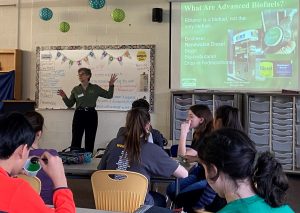

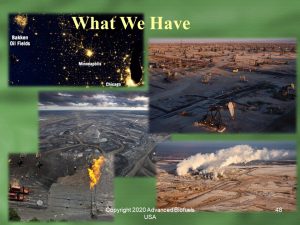

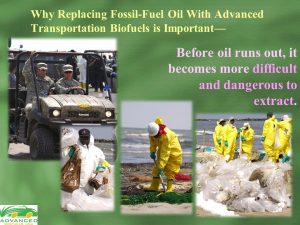

.jpg)





Comments are closed.